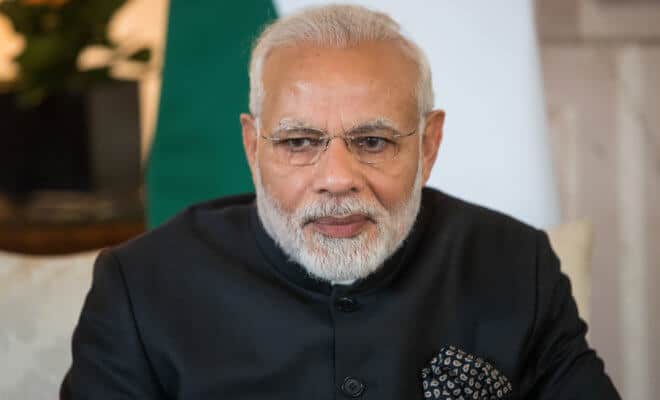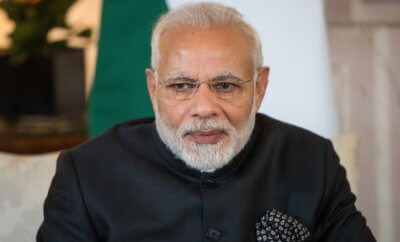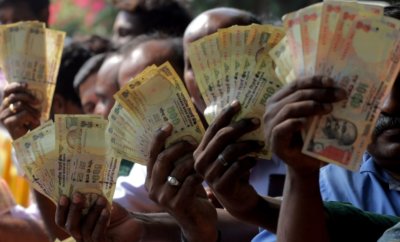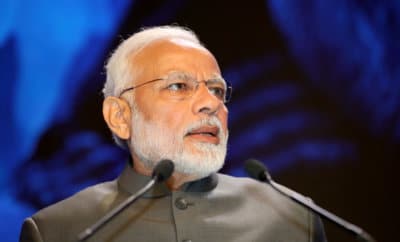Books
India’s New Textbooks Are Promoting The Prime Minister’s Favorite Policies, Critics Allege

Narendra Modi, India's prime minister, is shown in London on April 18, 2018.
Photo Credit: Bloomberg photo by Simon Dawson
Modi's governing Bharatiya Janata Party (BJP) has been criticized for pushing its agenda in textbooks in the states it controls.
New school textbooks in India promoting Prime Minister Narendra Modi’s flagship policies have prompted fresh criticism that the government is using the education system to further his political agenda.
An analysis of 25 textbooks by the Indian Express newspaper found examples of newly-inserted paragraphs casting Modi’s policies in a positive light, including programs like “demonetizing” that wiped out more than 85 percent of India’s cash or one to educate girls which has been criticized for lack of funding.
Critics maintain the changes to the textbooks are unbalanced and could skew children’s perceptions of politics and current events.
Modi’s government has been repeatedly criticized for being too image conscious and curbing freedom of the press, only giving scripted interviews to news organizations, and spending $638 million on publicity, including huge sums on newspaper advertisements and celebrity-studded television spots.
“It is not an honest way to make changes,” said Ambarish Rai, of India’s Right to Education Campaign. “If you’re putting in these things, you have to put in all the implications. This is only for publicity.”
Modi’s governing Bharatiya Janata Party (BJP) has been criticized in the past for pushing its agenda in textbooks in the states it controls. In Rajasthan and Gujarat, in particular, textbooks have been changed in the past two years to include Hindu nationalist icons and minimize contributions of Muslims in India.
The Express report said that many of the changes promoted Modi’s Clean India initiative, including in a 7th grade textbook. The Clean India mission has received international plaudits for the speed at which the government has installed millions of toilets in Indian homes – but has also been widely criticized for the harsh tactics the government uses to get people to stop defecating outside and use toilets instead.
In a 9th grade English textbook chapter where students are asked to imagine and write creatively about a future world without schools and books, Modi’s Digital India program to digitize payments is prominently featured. A 10th grade economics textbook includes a paragraph about his demonetization program and the government’s push towards digital payments, but does not mention the chaos that followed the announcement to replace 80 percent of India’s cash, leading to long lines outside banks for months and huge losses for small businesses.
The changes to the textbooks came after the National Council of Educational Research and Training, the body that publishes textbook prototypes, conducted a review of school textbooks, taking feedback from the public about current educational materials.
“What is interesting, is that the NCERT says that all of these additions and changes made were based on public feedback. I’m not sure of that,” said Ritika Sharma, the journalist who wrote the story for the Express.
Textbooks have sparked political controversy in India in the past as well. History textbooks written under previous governments led by the Congress Party enlarged the role of Congress leaders in India’s struggle for independence, while minimizing the role of other revolutionaries, according to Rai.
But Sharma said that textbooks written under the Congress Party governments were also critical of past failures of the party, not shying away from the its repressive rule during the Emergency of the 1970s and the anti-Sikh pogroms in the 1980s.
Textbooks written under the previous Congress-led administration also mentioned political events – but without promoting a party, Sharma said. The textbooks would mention India’s freedom of information law or the food security act. “But these were laws, not a mission launched by the government,” she said.
Alleged bias and political intent in school textbooks has been debated in a number of countries, including the United States, where mentions of evolution or intelligent design or the causes of the Civil War have caused controversy. Government textbooks in Egypt, for example, have recently scrubbed references to the Arab Spring uprising of 2011, while in China, textbooks firmly promote “socialist core values.”
In India, however, critics allege there is now a concerted campaign by the BJP and its supporters to dominate education, including by curbing free speech on university campuses and installing party supporters in senior academic roles.
“No party should use textbooks and children for their own political gains. Textbooks should be written on the basis of facts, on the basis of truth,” said Rai, from the Right to Education Campaign.
(c) 2018, The Washington Post



